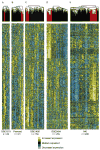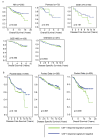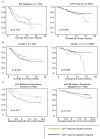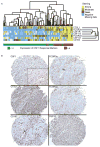The macrophage colony-stimulating factor 1 response signature in breast carcinoma
- PMID: 19188147
- PMCID: PMC2987696
- DOI: 10.1158/1078-0432.CCR-08-1283
The macrophage colony-stimulating factor 1 response signature in breast carcinoma
Abstract
Purpose: Macrophages play an important role in breast carcinogenesis. The pathways that mediate the macrophage contribution to breast cancer and the heterogeneity that exists within macrophages are incompletely understood. Macrophage colony-stimulating factor 1 (CSF1) is the primary regulator of tissue macrophages. The purpose of this study was to define a novel CSF1 response signature and to evaluate its clinical and biological significance in breast cancer.
Experimental design: We defined the CSF1 response signature by identifying genes overexpressed in tenosynovial giant cell tumor and pigmented villonodular synovitis (tumors composed predominantly of macrophages recruited in response to the overexpression of CSF1) compared with desmoid-type fibromatosis and solitary fibrous tumor. To characterize the CSF1 response signature in breast cancer, we analyzed the expression of CSF1 response signature genes in eight published breast cancer gene expression data sets (n = 982) and did immunohistochemistry and in situ hybridization for CSF1 response genes on a breast cancer tissue microarray (n = 283).
Results: In both the gene microarray and tissue microarray analyses, a consistent subset (17-25%) of breast cancers shows the CSF1 response signature. The signature is associated with higher tumor grade, decreased expression of estrogen receptor, decreased expression of progesterone receptor, and increased TP53 mutations (P < 0.001).
Conclusions: Our data show that the CSF1 response signature is consistently seen in a subset of breast carcinomas and correlates with biological features of the tumor. Our findings provide insight into macrophage biology and may facilitate the development of personalized therapy for patients most likely to benefit from CSF1-targeted treatments.
Conflict of interest statement
Conflict of Interest: There are no conflicts of interest.
Figures




References
-
- Condeelis J, Pollard JW. Macrophages: obligate partners for tumor cell migration, invasion, and metastasis. Cell. 2006;124:263–6. - PubMed
-
- Pollard JW. Tumour-educated macrophages promote tumour progression and metastasis. Nat Rev Cancer. 2004;4:71–8. - PubMed
-
- Sapi E. The role of CSF-1 in normal physiology of mammary gland and breast cancer: an update. Exp Biol Med (Maywood) 2004;229:1–11. - PubMed
-
- Scholl SM, Pallud C, Beuvon F, et al. Anti-colony-stimulating factor-1 antibody staining in primary breast adenocarcinomas correlates with marked inflammatory cell infiltrates and prognosis. J Natl Cancer Inst. 1994;86:120–6. - PubMed
-
- Maher MG, Sapi E, Turner B, et al. Prognostic significance of colony-stimulating factor receptor expression in ipsilateral breast cancer recurrence. Clin Cancer Res. 1998;4:1851–6. - PubMed
Publication types
MeSH terms
Substances
Grants and funding
LinkOut - more resources
Full Text Sources
Other Literature Sources
Medical
Research Materials
Miscellaneous

